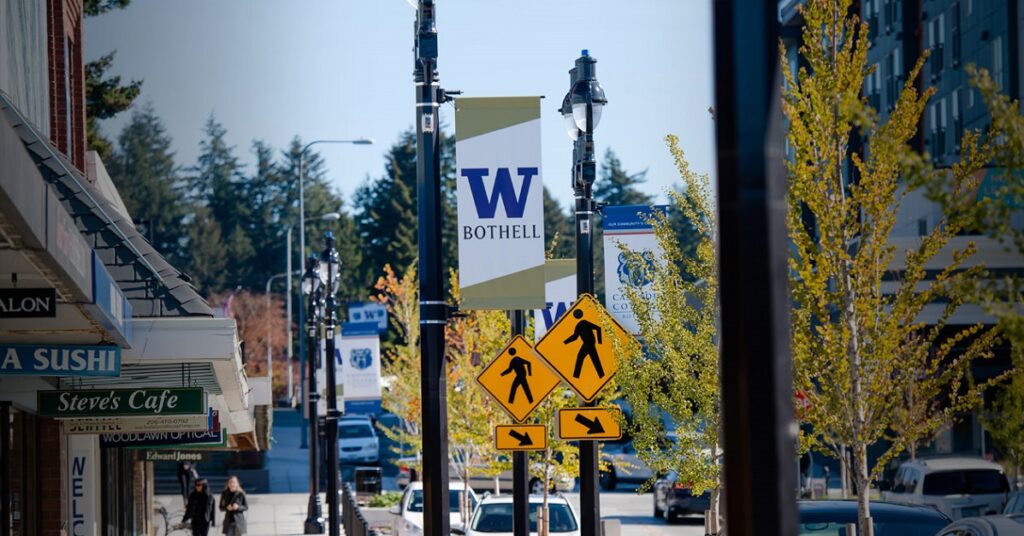
BOTHELL, Wash. Nov. 26, 2019 — The University of Washington Bothell generated a total impact on the state’s economy of more than $341.8 million in FY 2018, according to an economic contribution analysis released last week. The study further concludes that UW Bothell’s economic activity supported or sustained 2,322 jobs throughout the state.
The UW Bothell campus makes a significant impact on the communities it serves and the state of Washington. The analysis shows that the economic contribution of UW Bothell has increased significantly over the past five years: Since 2014, the impact has increased by 37% when adjusted for inflation, rising from $249.6 million to $341.8 million.
“As one of the largest employers in our area providing exceptional education, job opportunities and endless prospects for collaboration, we are very fortunate to have UW Bothell in our community,” said Brittany Caldwell, executive director of the Bothell Kenmore Chamber of Commerce.
The study was part of a larger effort that measured the economic contribution of UW’s overall operations including its campuses and projects across the state of Washington, in the Puget Sound and in the cities of Seattle, Tacoma and Bothell. The study also provides individual impact analyses of UW Medicine, UW Research, Intercollegiate Athletics, alumni of the University and CoMotion — a UW collaborative innovation hub dedicated to expanding the economic and societal impact of the UW community.
“UW Bothell is one of the most diverse campuses in the state of Washington,” said Wolf Yeigh, UW Bothell chancellor. “We make a cross-disciplinary, four-year degree more accessible and achievable for more students by providing a world-class educational experience that prepares them for success — in life, work and their communities.”
The study was conducted by Parker Philips, a nationally recognized consulting firm specializing in economic impact analysis. Nichole Parker, a principal partner at Parker Philips, said, “Economic contribution is an objective way to measure the significance of an organization in the regional economy. It is a tool that policymakers can use to inform their decisions and empirical context that shows the impact of the institution. UW Bothell is a unique and sustainable economic driver that is making a demonstrable impact on Washington.”
Among the findings in the study:
- The $341.8 million total economic impact of UW Bothell in FY 2018, which included $183.6 million direct and $158.2 million indirect and induced spending, was the result of operational spending, capital spending (three-year average), payroll and benefits paid to employees, student spending and visitor spending;
- The operations of UW Bothell supported or sustained a total of 2,322 jobs;
- Through its local spending and the jobs it supported or sustained, UW Bothell generated $19.5 million in state and local taxes;
- The staff, faculty and students of UW Bothell contribute an estimated $546,252 annually in charitable giving and volunteerism; and
- UW Bothell generated $16.7 million in visitor spending in FY18.
In addition to the significant impact of campus operations, the income being added into the economy as a result of UW Bothell graduates obtaining post-secondary education is significant.
- According to a 2018 PayScale report, UW Bothell alumni earned the “best ROI” among all alumni from Washington state colleges, making $609,000 more in 20 years than high school graduates do. The national average is around $225,000.
- A 2019 report from PayScale analyzed schools across the country to determine whose graduates have the highest earning potential and ranked UW Bothell No. 3 in the nation.
- In 2019, CNBC also ranked UW Bothell No. 2. in the nation for public colleges that provide the greatest return on investment.
In the 2018-19 academic year, UW Bothell graduated more than 2,200 students. Among undergraduates, 61% graduated debt free; among graduate students, 54% graduated debt free.
In fall 2019, of the nearly 6,000 students who are attending UW Bothell, 40% of incoming first-year students and 43% of incoming transfers would be first in their immediate families to earn a four-year degree.



